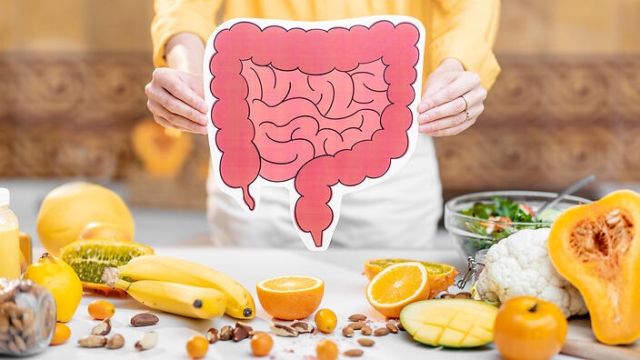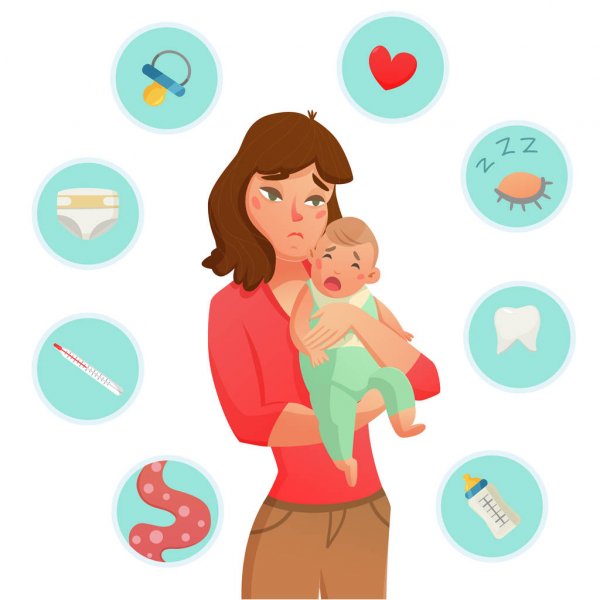It is very common for babies to have intestinal problems, which can happen for different reasons – from an error in the breast attachment (which usually causes gas), even complications caused by intolerances or allergies.
It is not rare that the child suffers from colic, which usually starts around 15 days of life and ends at 3 or 4 months.
Despite being common, these intestinal discomforts can be a major discomfort for the baby—and high-pitched crying is one of the signs that colic has occurred. Therefore, taking some supportive measures to improve symptoms is essential.
Taking care of the intestinal flora can be the solution. For this, Colitis is a safe, practical and effective measure that can help in these situations. See more information about this medication:
In this article you will find:
- What is Collitis?
- What is the composition of Collitis?
- What are probiotics?
- Baby’s intestinal microbiota: what is it and how is it formed?
- Why are baby colic common?
- Is colic serious?
- What is the function of Colitis?
- How to use and what is the dosage?
- How long does it take for Colitis to take effect?
- Does Colitis have side effects?
- Value: what price and where to buy?
- What is the difference between Colitis and Colikids?
- Is this crying colic?
What is Colitis?
Colitis is a product based on probiotics isolated from breast milk, Lactobacillus reuteri DSM 17938, which can help balance the intestinal flora of babies and may have benefits for good digestive functioning.
It is common for mothers and fathers to be concerned when giving any type of substance or even food to very young children. But L.Reuteri DSM 17,398 is a widely studied lactobacillus, with more than 200 clinical trials published in leading international scientific journals.
Used in more than 100 countries, it has been studied in more than 5700 infants and has been scientifically shown to reduce colic in 95% of cases — therefore, its use is safe and proven to be effective in aiding good bowel function.
In newborns, it is not uncommon for intestinal discomfort to occur, and this can cause great apprehension in fathers and mothers. In the vast majority of cases, they are transitory conditions (that is, they will spontaneously cease after some time) and that do not have a pathological origin.
Generally speaking, they only indicate that the baby’s organism is still in the process of maturation. This is exactly why the vast majority of cases stop around the 3rd or 4th month of the baby’s life.
But in the meantime, finding measures that contribute to the well-being of the little ones is very important, even alleviating the mental strain on the family.
Colitis acts by stimulating non-pathogenic bacteria (that is, bacteria that do not cause disease), which promotes the reduction of bacteria that cause fermentation during digestion, often resulting in pain and discomfort.
Thus, “it modulates bowel movements by producing substances called Short Chain Fatty Acids (SCFA) that help in intestinal motility, promoting better bowel movement.”
Thus, it can also be indicated for episodes of constipation or diarrhea, helping to regularize bowel movements.
It should be noted that L.Reuteri DSM 17.398 is similar to what is naturally in breast milk. Therefore, it does not usually present risks or cause complications that could harm the fragile digestive system of babies.
Despite this, it is necessary to follow the medical recommendations and only give the medicine with a prescription, in order to avoid wrong doses or even cases of allergies and intolerance.
Finally, this is usually a medium to long-term therapy, as Colitis can take up to two weeks to rebalance the intestinal flora and take effect.
What is the composition of Colitis?
Colitis is compounded undefined by the probiotic Lactobacillus reuteri DSM 17938, naturally present in some parts of the body, such as the mouth and intestinal tract. Furthermore, it is one of the few that manage to reside in the human intestinal tract.
This lactobacillus was isolated from human breast milk, which makes it quite safe for children, reducing the risk of rejection by the little ones’ bodies.
The human intestine is inhabited by trillions of living beings, some of which harm us. Probiotics, such as L.Reuteri DSM 17,938, act by promoting an increase in non-pathogenic bacteria in the intestine, that is, those that cannot cause disease.
At the same time, it prevents the growth of those that can be harmful and trigger pathologies.
What are probiotics?

In recent years, it has been more frequent to hear about the benefits of consuming probiotic foods, as they support intestinal health. That’s true, but not all good bacteria are the same.
There are different types, causing them to act in different ways in the body.
Probiotics are live microorganisms and act in our body facilitating the digestive processes and the absorption of nutrients. In addition, a daily intake and adequate doses can promote immunity, prevent possible diseases, and improve digestive functioning.
It is essential that good bacteria are resistant to conditions in the body. Thus, they need to survive the pH variations of the intestinal tract, gastric enzymes and also that they manage to adhere to the intestinal mucosa.
Food, environmental factors and other pathologies can interfere with the intestinal microbiota. And in babies, especially newborns, it is mainly the type of delivery, type of breastfeeding and maternal nutrition.
Baby’s intestinal microbiota: what is it and how is it formed?
Intestinal microbiota is, basically, the set of microorganisms that colonize the intestinal tract and that, under normal conditions, help to maintain the proper functioning of the organism.
When in balance, this complex system helps in the digestion and absorption of nutrients and in controlling the proliferation of harmful bacteria — that is, those that can trigger disease or pose health risks.
At birth, the human intestinal tract is sterile, meaning that it is not populated by any microorganism.
But it is already in normal childbirth that colonization of the intestinal flora begins and continues through feeding. If the delivery is by cesarean, the first contact is through food (breast milk or supplements).
The complete formation of the infant microbiota is essential for the integrity of the organism, as it is directly related to the control of harmful bacteria and the maintenance of good immunity.
Therefore, the proper use of probiotics, such as those present in breast milk, can have good results. This is because they are fixed in the gastrointestinal tract and help in its proper colonization.
It is estimated that the intestinal microbiota pattern is established up to 2 years of age. But throughout life, some factors can interfere with the balance of the composition of microorganisms. Among them, food, the indiscriminate use of antibiotics and some gastrointestinal diseases (such as inflammatory bowel diseases), for example.
Why are baby colic common?
Colic in babies has been studied for a long time, and “the role of the infantile gastrointestinal microbiota in the origin of colic has recently come into focus, with several randomized clinical trials demonstrating differences in the intestinal microbiota between children with and without colic”.
When they are born, babies’ bodies are still getting used to life outside the womb. Some systems are not yet fully formed, such as the intestinal tract.
This means that peristaltic movements (which are muscle contractures) still occur in an uncoordinated manner, and may disturb the correct intestinal transit, causing some dilations.
Along with this, there are still some factors that favor the formation of gas, such as the wrong grip on breastfeeding. It can cause the ingestion of air, which if not eliminated by belching, ends up turning into gases that cause this discomfort.
The result of all this is often the famous colic in the baby, which usually cause a lot of concern to fathers and mothers.
Colic is usually defined as episodes of at least 3 hours in duration, for at least 3 days a week, and for more than 3 weeks.
When they do occur, one of the most evident signs is the crying that, in general, is not stopped by any measure, such as food, diaper change or cervix. It is common for the little ones to show irritation, agitation and seem uncomfortable.
But it is worth paying attention to some characteristics of the crying itself as well, as there may be other indications that the cause is really colic:
- The child usually cries between late afternoon and early evening;
- The child tends to stretch and stiffen the legs due to the pain;
- Colic may stop abruptly when the child changes position and may return some time later.
Is colic serious?

Colic itself is usually not serious or harmful, but because it causes great discomfort to the baby and apprehension to the family, it can trigger side effects such as excessive worry and anxiety in parents.
As the child tends to cry a lot, and there aren’t many things that can ease the pain, the whole family’s rest and routine are affected. If the condition lasts too long, physical and emotional well-being can be compromised.
In addition, the child feels a lot of pain and discomfort, which may even compromise proper nutrition and sleep, aggravating irritation.
What is the function of Colitis?
According to the package insert, Colitis has the function of collaborating with the child’s intestinal health, which is possible due to the fact that it helps in the balance of the intestinal flora, through intestinal colonization with beneficial bacteria.
With that, Colitis can be an aid in the relief of diarrhea or intestinal gas, very common problems in babies.
In fact, intestinal gas is often responsible for the colic that affects babies, so this is one of the main factors that lead mothers and fathers to seek pediatricians.
In adequate doses, Lactobacillus reuteri helps balance the baby’s intestinal flora. This has a series of beneficial effects on bowel function, as:
“The balance of the intestinal flora reduces intestinal inflammation, increases the production of intestinal protective mucus, increases the acidity in the large intestine which helps to reduce the proliferation of fermenting bacteria, increases the barrier effect in the intestine, protecting against infections and food allergies, and mainly by harmony in the flow of information in the intestine-brain axis”.
All this makes the intestinal health of babies is strengthened, which can reduce discomforts such as colic.
How to use and what is the dosage?
Despite being a compound of probiotics isolated from breast milk, which contribute to the health of the body as a whole, Colidis must be used under medical prescription in order to avoid any harm to the child’s health.
According to the information on the package insert, the daily dose should be a maximum of 5 drops a day, as it provides 108 UFC (100,000,000 Colony Forming Units) of Lactobacillus reuteri DSM 17938 live.
Also, the instructions for using this medication correctly are as follows:
- Shake the product before using;
- Turn it over with the dispenser facing down and wait for the drops to fall (it is not necessary to shake the package);
- Mix the medication in milk (or other liquid) at cold or room temperature.
Colitis should not be mixed with hot foods or liquids as this can damage lactobacilli that are sensitive to heat.
How long does it take for Colitis to take effect?
As mentioned, Colitis improves the functioning of the child’s intestines and replenishes the intestinal flora, so it also collaborates with other health-related factors.
Thus, it is not a medication that seeks immediate effect. In order for it to be effective, it is necessary that probiotics act in the body, that is, increasing non-pathogenic bacteria and collaborating with intestinal processes.
Thus, the idea is that with time of use, it promotes better digestion and less gas formation, helping to eliminate cramps and discomfort. Which can take up to 30 days.
It is noteworthy that Colitis helps in intestinal health and can promote benefits to healthy children who are in the microbiota formation phase.
Therefore, it is a medium to long-term supportive treatment and tends not to work if it is given to the child on time, with the exception of diarrhea, as it can help to replenish the intestinal flora more quickly.
It is noteworthy that, in cases of colic in babies, even using Colidis, other factors can contribute to eliminate this problem.
For example, the pediatrician can provide guidance on breast-feeding or bottle-feeding, as if the child swallows air during breastfeeding, they will likely experience these discomforts.
In addition, if the baby is a few months old and still suffers frequently from intestinal tract problems, be sure to seek out a professional for help.
Does Colitis have side effects?
There is no indication in the package insert for Colitis as to possible side effects, only the recommendation can be found not to use it above the maximum daily dose (5 drops) and not to use it in case of sensitivity to the composition – in order to avoid possible complications .
However, some people report that even when using the medication according to the pediatrician’s instructions and in the appropriate doses, the child had adverse reactions, such as diarrhea.
It is noteworthy that these reactions may be linked, for example, to a child’s sensitivity or allergy to the drug.
Therefore, the ideal is to continue following the pediatrician’s recommendation and if the child presents any changes, discontinue use and seek medical assistance.
Does it make you sleepy?
Colitis has no indication of changes in sleep. However, it is worth considering the fact that many babies find it difficult to rest due to severe pain or discomfort resulting from intestinal malfunction.
Therefore, as there is a balance of the intestinal microbiota and a maturation of the intestine, it is normal for discomfort to diminish or cease, which can contribute to sleep and rest.
However, in this case, it is not an adverse reaction, just a consequence of the effects of the medication on the child’s well-being.
Value: what price and where to buy?
You can buy Colitis at any pharmacy. However, if you want more convenience, it is also possible to find this medication online.
What is the difference between Colitis and Coli kids?
Coli kids is the old name of Colitis. Thus, the product did not change its formula, milligram or form of use, only the marketing name was changed.
Is this crying colic?

When little ones start crying constantly and for no apparent reason, fathers and mothers often show anxiety and worry. And colic is pointed out as a relatively common problem in the first weeks of life.
To be sure that the cause of crying is really abdominal pain, the tip is to always discard other factors, such as hunger, diaper change or even fear. Since there is still so much new outside the womb, the baby may feel scared.
Therefore, some simple tips to deal with the situation are:
- Look for a calm environment to be with the child;
- Avoid excessive noises or movements that could cause more agitation;
- Give baths or use warm compresses, as they can soothe or even relieve cramps;
- Take the baby in your arms, talk in a soft voice and convey tranquility.
In addition, it is important to pay attention to the mother’s emotional state, as tiredness, stress and anxiety can affect the little one as well.
Cramps, crying and irritability in children who are not gaining weight, are irritated and restless on a daily basis, have to be examined and investigated for other causes, in addition to colic in the infant.
That is, if it is persistent and intense, it is essential to seek medical help.
It is common for children, especially babies, to suffer from intestinal problems such as cramps and diarrhea. Therefore, seeking help from a pediatrician is essential in order to understand what is triggering the problem and enable treatment.
To aid in the maturation of the intestine, so that it can help to reduce discomfort, Colitis can be prescribed by pediatricians, always combined with other health and well-being habits.







